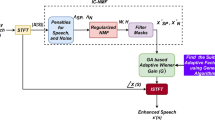Abstract
This paper proposes a novel Independent Component Analysis algorithm based on the use of genetic algorithms intended for its application to the field of non-linear speech processing. Independent Component Analysis (ICA) is a method for finding underlying factors from multidimensional statistical data, so it can be efficiently applied to suppress interferences and demodulate information in Multilnput-MuliOutput (MIMO) systems.
Access this chapter
Tax calculation will be finalised at checkout
Purchases are for personal use only
Preview
Unable to display preview. Download preview PDF.
Similar content being viewed by others
References
L. B. Almeida. ICA of linear and nonlinear mixtures based on mutual information. In Proc. 2001 Int. Joint Conf. on Neural Networks, Washington, D.C., 2001
G. Burel, Blind separation of sources: A nonlinear neural algorithm, Neural Networks, vol. 5, pp. 937–947, 1992.
J.F. Cardoso, Source separation using higher order moments, in Proc. ICASSP, Glasgow, U.K. May, pp. 2109–2212, 1989.
E.C. Cherry, Some experiments in the recognition of speech, with one and two ears. Journal of the Acoustical Society of America, 25, 975–979. 1953.
P. Comon, Independent component analysis, a new concept?, Signal Processing, vol. 36, no. 3, pp. 287–314, 1994.
M. Faúndez, S. McLaughlin, A. Esposito, A. Hussain, J. Schoentgen, G. Kubin, W. B. Kleijn and P. Maragos, Nonlinear speech processing: overview and applications, in Int. J. Control Intelligent Syst, vol. 30, num. 1, pp. 1–10, 2002.
D.E. Goldberg, Genetic Algorithms in Search, Optimization and Machine Learning. AddisonWesley, Reading, MA, 1989.
A. Hyvarinen and E. Oja, A fast fixed-point algorithm for independent component analysis. Neural Computation, 9 (7), pp. 1483–1492, 1997.
A. Hyvärinen and P. Pajunen. Nonlinear Independent Component Analysis: Existence and Uniqueness results. Neural Networks 12(3): pp. 429–439,1999.
C. Jutten and J.F. Cardoso. Source separation: really blind ? In Proc. NOLTA, pages 79–84, 1995.
T-W. Lee, B. Koehler, R. Orglmeister, Blind separation of nonlinear mixing models, In IEEE NNSP, pp. 406–415, Florida, USA, 1997.
J.K. Lin, D.G. Grier, J.D. Cowan, Source separation and density estimation by faithful equivariant SOM, in Advances in Neural Information Processing Systems. Cambridge, MA: MIT Press, vol. 9, 1997.
Z. Michalewicz, Genetic Algorithms + Data Structures = Evolution Programs, Springer-Verlag, New York USA, Third Edition, 1999.
P. Pajunen, A. Hyvarinen, J. Karhunen, Nonlinear blind source separation by self-organizing maps, in Progress in Neural Information Processing: Proc. IONIP’96, vol. 2. New York, pp. 1207–1210, 1996.
F. Rojas, I. Rojas, R.M. Clemente, C.G. Puntonet. Nonlinear Blind Source Separation using Genetic Algorithms, in Proceedings of the 3rd International Conference On Independent Component Analysis and Signal Separation (ICA2001). pp. 400–405, December 9–13,, San Diego, CA, (USA), 2001.
A. Taleb, C. Jutten, Source Separation in Post-Nonlinear Mixtures, IEEE Transactions on Signal Processing, vol. 47 no. 10, pp. 2807–2820, 1999.
D. Yellin, E. Weinstein, Multichannel signal separation: Methods and analysis, IEEE Trans. Signal Processing, vol. 44, pp. 106–118, 1996.
Author information
Authors and Affiliations
Editor information
Editors and Affiliations
Rights and permissions
Copyright information
© 2003 Springer-Verlag Berlin Heidelberg
About this paper
Cite this paper
Rojas, F., Puntonet, C.G., Rojas, I., Ortega, J. (2003). An Independent Component Analysis Evolution Based Method for Nonlinear Speech Processing. In: Mira, J., Álvarez, J.R. (eds) Artificial Neural Nets Problem Solving Methods. IWANN 2003. Lecture Notes in Computer Science, vol 2687. Springer, Berlin, Heidelberg. https://doi.org/10.1007/3-540-44869-1_86
Download citation
DOI: https://doi.org/10.1007/3-540-44869-1_86
Published:
Publisher Name: Springer, Berlin, Heidelberg
Print ISBN: 978-3-540-40211-4
Online ISBN: 978-3-540-44869-3
eBook Packages: Springer Book Archive




